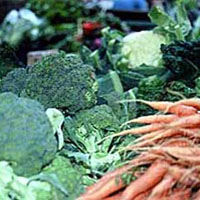Villages control food prices
A new initiative aims to reconnect customers with producers and make people more aware of local food has been launched


A new initiative aims to reconnect customers with producers and make people more aware of local food at a time when prices are volatile and food scares are headline news. Making Local Food Work, a five-year, Big Lottery Fund-supported programme, is led by the social-enterprise organisation Plunkett Foundation, which has funded 60 community-owned shops and works with bodies such as the Soil Association and the CPRE, helping people find community enterprises through which they can enjoy access to healthy and inexpensive local food.
The Headingly Pig Co-op near Leeds is one such example, a buying co-operative linked to a nearby organic farm. For a modest membership fee and quarterly payment, each member is given a pre-agreed number of cuts of free-range-certified organic pork. Members can see that the pigs are well cared for and humanely slaughtered, and the guaranteed income and lack of a middle man means that the farmer, Jo Cartwright, is able to sell meat to them at competitive prices. She says: ‘The Fowl and Pig Co-ops give my business an important element of stability in these tricky times. I’d recommend it to anyone.’
Jo Cartwright is not the only one to be making a success of such a sheme. In Somerset, the community run Bridie’s Yard Organic Food Co-op in Glastonbury was started by a group of parents wanting to ensure their children had access to healthy food. It’s a shop-based co-operative, with some 645 members and 60 to 70 customers a week.
Because the aim isn’t for increased profits, members benefit from a lower than usual mark-up on food. Volunteers run every aspect, from financial management to stacking shelves. When the village shop and post office closed in Lanreath, Cornwall, 450 villagers were faced with a four-mile drive to make the most basic purchases. They decided to set up a community owned shop, converting an old toilet block. Three more have opened this month, at Avebury in Wiltshire, Ryburgh, Norfolk, and Feckenham, Worcestershire.
Making Local Food Work (www.makinglocalfoodwork.co.uk) can help communities improve access to local, fresh and sustainably produced food and advise them on starting their own enterprises. It’s linked to the Community Supported Agriculture (CSA) programme, in which people can invest in a local farm in return for a share of the harvest. ‘We’ve certainly seen a strong surge of interest, but it’s a constant challenge and more difficult than the case histories make it look,’ warns the Soil Association’s Dan Keech, who works on CSA.
‘The good thing is that it’s the first time so many organisations have worked together on all aspects of the food chain, but fulfilling demand is a constant headache for us. We’re not on an evangelical mission to take over; our aim is to complement the retail industry and raise awareness of food sources.’
Exquisite houses, the beauty of Nature, and how to get the most from your life, straight to your inbox.
Country Life is unlike any other magazine: the only glossy weekly on the newsstand and the only magazine that has been guest-edited by His Majesty The King not once, but twice. It is a celebration of modern rural life and all its diverse joys and pleasures — that was first published in Queen Victoria's Diamond Jubilee year. Our eclectic mixture of witty and informative content — from the most up-to-date property news and commentary and a coveted glimpse inside some of the UK's best houses and gardens, to gardening, the arts and interior design, written by experts in their field — still cannot be found in print or online, anywhere else.
